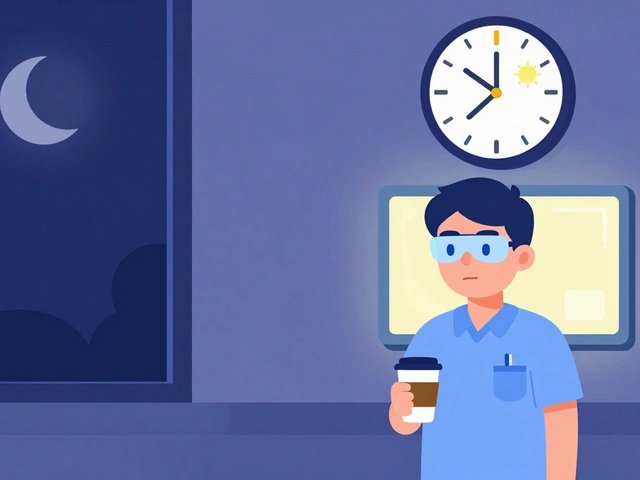
Hey there! If you're spinning out of control with vertigo, you're probably searching for something to steady the ship. Meclizine could be your new best friend. It's an over-the-counter option that many rely on to help calm those dizzy spells. But how does it actually work? And more importantly, what should you expect when you give it a go?
Before you pop a pill, it's good to know what's happening inside your body. Vertigo isn't just your average dizziness—it's a whirlwind inside your head, often making the room feel like it's in motion. The culprit? Issues in the inner ear or brain might be to blame. Meclizine steps in as an antihistamine, but not like the kind you take for hay fever. It's a bit of a multi-tasker, blocking certain signals in your brain to help bring back your balance.
- Understanding Vertigo
- How Meclizine Works
- Dosage and Usage
- Potential Side Effects
- Tips for Effective Use
Understanding Vertigo
Alright, let's talk about vertigo, the uninvited guest that makes you feel like you're on a merry-go-round that won't stop. Vertigo is not just a simple feeling of dizziness; it's more intense. It feels like the room is spinning around you, even when you're perfectly still. How's that for a party trick?
So, what's causing all this upheaval? The main issue often starts in the inner ear. You might be surprised to learn that the tiny structures in your ear are responsible for keeping you balanced. When these get disrupted—be it due to an infection, inflammation, or conditions like benign paroxysmal positional vertigo (BPPV)—it can throw your whole world out of whack.
More Than Just Dizziness
Vertigo can be more than just feeling dizzy. Sometimes it's accompanied by nausea, vomiting, or even difficulties with walking. So, if that morning spin cycle is paired with these buddies, vertigo could be the culprit. The good news? Options like Meclizine are there to help put the brakes on.
Who Gets Vertigo?
Did you know that vertigo is more common than you might think? It affects as many as 35% of adults over 40 in the U.S at some point. That's a pretty hefty chunk of the population! Conditions like migraines and aging might increase the risk, so if you find yourself in a spin more often than not, you're not alone.
Now that we've got a handle on what vertigo is, it's time to look at how Meclizine can tackle this dizzying dilemma. Stick around, because there's more to discover about getting your feet back on solid ground.
How Meclizine Works
Want to know what makes Meclizine tick when tackling vertigo? It's all about chemistry and brain signals. Meclizine is part of a group of drugs called antihistamines, but don't confuse this with your regular allergy-busting medicine. This stuff works differently!
First up, Meclizine does its magic by acting on the central nervous system. The primary target? Histamine receptors in your brain. By blocking these receptors, it prevents confusing balance-related signals from being sent to your brain. Think of it as cutting off the noise to enjoy your music—pretty neat, right?
Getting to the Core of Dizziness
When you feel dizzy, it's often due to mixed messages being sent from your inner ear to the brain. Meclizine helps clear up the confusion by calming the vestibular system. If you're wondering, that's the part responsible for balance and spatial orientation. Calm vestibular system means less chance of the world spinning unexpectedly.
Bonus Effects on Nausea
And it gets better! Meclizine isn't just stopping the spin. By controlling those mixed signals, it also helps kick nausea to the curb. Less dizzy, less queasy. It's a double win!

Dosage and Usage
Using Meclizine for vertigo doesn't need to feel like solving a Rubik's cube. The key is understanding how much to take and when. Let's get into it!
How Much Should You Take?
Typically, the dosage for most adults dealing with vertigo ranges from 25 to 100 mg a day, depending on the severity of your symptoms. It's usually taken in divided doses. But, hey, keep in mind this isn't one-size-fits-all. Always check with your doctor or healthcare provider to tailor the dose to your needs.
For those new to Meclizine, it's wise to start with a lower dose and see how your body reacts. No rush here!
When to Pop a Pill?
The best time to take Meclizine is when you start feeling the initial signs of vertigo. If it's travel-related dizziness, taking it an hour before your journey can help keep the spins at bay.
Consistency is Key
If you've been prescribed a routine for Meclizine, sticking to a regular schedule can make a world of difference. Try taking it at the same times each day to keep those vertigo gremlins in check.
Anything to Watch Out For?
A quick reminder: don't suddenly stop taking Meclizine without consulting your healthcare provider, especially if it's been part of your regular regimen. You don't want to risk your symptoms bouncing back.
A Small Tip
Here's a habit to avoid: don't double up on doses if you accidentally miss one. Just take it as soon as you remember or wait until your next scheduled dose if it's near.
With this guide, you're set to get a grip on your vertigo. But remember, your healthcare provider's advice should always be the guiding star!
Potential Side Effects
So, you're thinking of taking Meclizine for that pesky vertigo? That's a solid plan, but it's good to know what else might happen when you start using it. Most people tolerate Meclizine pretty well, but like anything, it's got its quirks.
Common Side Effects
Let's start with the usual suspects. Many folks report feeling drowsy after taking Meclizine. It's kinda like that after-lunch slump but might hit you anytime. So, maybe not the best time to drive or operate heavy machinery, huh? Also, you might feel a dry mouth creeping up—not the worst, but it's good to keep some water handy.
Less Common Side Effects
While these aren't standard, they can happen. Some people might experience headaches or a bit of blurred vision. If this happens, it might be worth checking with a doc to make sure it's nothing more serious.
When to See a Doctor
- If you notice any serious allergic reaction like rash or trouble breathing—call the doc. Allergies are rare but not impossible.
- Persistent side effects can also be a sign it's time for some professional advice. You shouldn't have to suffer through them unnecessarily.
Remember, these are just potential side effects and not a guarantee you'll experience them. Still, it's better to be prepared, right? Adjusting to any med, even over-the-counter ones like Meclizine, can take some time. Listen to your body and take it easy as you figure out how it affects you.

Tips for Effective Use
You're thinking of giving Meclizine a shot for your vertigo? Great choice! Here are some practical tips to make sure you get the most out of it without any hiccups.
1. Follow the Directions
Even though you can grab Meclizine over-the-counter, it's crucial to follow the dosage instructions on the package or consult with a healthcare professional. Adults typically take between 25-50 mg once or twice a day, depending on the severity of their symptoms. But hey, everybody's different!
2. Plan Ahead
Meclizine works best when taken at the onset of symptoms. If you're prone to vertigo episodes, consider taking it before situations that might set off your dizziness, like a long car ride.
3. Watch Out for Side Effects
While Meclizine is usually well-tolerated, it can cause drowsiness. It might be smart to avoid driving or operating heavy machinery until you know how it affects you. Oh, and skip the alcoholic beverages—they can amp up the drowsy feeling.
4. Talk to Your Doc
If you find yourself downing Meclizine regularly or if it's not doing the trick, it might be time for a chat with your healthcare provider. There could be something else going on, and they might suggest alternative treatments.
5. Keep Track of Your Usage
Using a medication log can be surprisingly helpful. Jot down your dosage, timing, and any side effects. This way, if you need to discuss your treatment with a doctor, you'll have all the information at your fingertips!
Ultimately, if you remember to use Meclizine wisely, it can be an effective ally in your quest against vertigo. Stay safe and here's to steadier days ahead!
11 Comments
Michele Radford
July 19, 2025 AT 12:10 PM
Honestly, I can’t help but feel cautious about recommending any over-the-counter medication without proper consultation, especially for something as complicated as vertigo, which can mask more serious conditions. Meclizine might be a quick fix, but relying on it while ignoring underlying causes seems irresponsible.
People sometimes underestimate the implications of masking symptoms. Why not use this opportunity to seek a comprehensive diagnosis rather than just suppressing the dizziness? Plus, there's a tendency for some to misuse such medications thinking they’re harmless just because they're OTC, leading to misuse or even dependency.
Was there any mention of the risks involved with prolonged consumption or potential interactions with other medications people might be taking? I think this deserves more emphasis.
Mangal DUTT Sharma
July 20, 2025 AT 10:26 AM
Hey folks! Just wanted to add some perspective here on how I used Meclizine for a while when vertigo really hit me hard after an inner ear infection. 🌟 It was a lifesaver in those moments. The dizziness was so overwhelming I couldn’t function at work or even drive safely.
One thing to note is that the side effects like drowsiness were definitely real for me, so I avoided any heavy machinery or driving while on it. But it really helped my quality of life when the spinning wouldn’t stop. What’s interesting is how Meclizine blocks histamine H1 receptors, which is why it also causes that sedation.
Does anyone else have tips on balancing symptomatic treatment with finding root causes? Would love to hear more experiences. 😊
Gracee Taylor
July 21, 2025 AT 15:36 PM
I appreciate the detailed explanations here. Vertigo can be so disruptive, and having an OTC option is sometimes comforting, especially when waiting for a physician's appointment might take time. That said, I do think cautious use is mandatory. The article’s note on potential side effects is critical—people sometimes overlook mild symptoms that can later impact daily functioning.
Also, for those with conditions such as glaucoma or enlarged prostate, Meclizine could exacerbate symptoms due to its anticholinergic properties. Has anyone encountered warnings from their pharmacists about these?
In my view, awareness is the best tool alongside medication. Combining lifestyle changes and vestibular rehabilitation with Meclizine might offer a more holistic approach.
Leslie Woods
July 22, 2025 AT 18:00 PM
Can I just ask, is Meclizine suitable for all kinds of vertigo? Like, example: benign paroxysmal positional vertigo (BPPV) versus vertigo stemming from migraines? I’m wondering because I’ve struggled with dizziness that fluctuates depending on my head position, and not sure if an OTC like Meclizine would give me real relief or just mask symptoms.
Also, how about dosage considerations? The article mentioned effectiveness but I’m curious if lower doses can still work without causing too much tiredness or other side effects.
Any personal recommendations on dosage or frequency would be hugely appreciated!
Manish Singh
July 25, 2025 AT 01:33 AM
That's a really good question about vertigo types. Based on what I learned, Meclizine is generally effective for vertigo caused by vestibular system disturbances but is not necessarily a cure for all underlying problems.
As someone who deals with occasional vertigo, I've been advised by my doctor to take it exactly as prescribed because the dosage can vary widely depending on the severity of symptoms and individual tolerance.
Also, keep in mind that long-term dependency on Meclizine isn’t recommended; it’s ideally a short-term symptom management solution. The phenomenon of rebound dizziness can sometimes happen if you stop suddenly.
It's always a good idea to combine with vestibular therapy and lifestyle adjustments.
Dipak Pawar
July 26, 2025 AT 05:20 AM
Adding to that, the pharmacokinetics of Meclizine suggest it has a relatively long half-life, which means the drug stays active in your system for quite some time. This can be beneficial for sustained relief but might also contribute to prolonged side effects like drowsiness or cognitive dulling.
From a cultural perspective, it's intriguing how over-the-counter availability in some countries contrasts with stricter prescription policies elsewhere. Accessibility plays a huge role in self-medicating behavior, and we must be mindful that while Meclizine offers a quick remedy, it might discourage people from seeking underlying diagnoses, especially in resource-limited settings.
Lastly, regarding your earlier question—Meclizine’s efficacy varies by vertigo type as it primarily targets vestibular suppressants, so migraine-related vertigo might not respond the same.
Jonathan Alvarenga
July 27, 2025 AT 09:06 AM
Typical OTC miracle drug hype, huh? I mean, sure, Meclizine has its uses but it isn’t some magical cure-all. People really need to be more skeptical especially when it’s pushed as a one-stop solution for vertigo.
The side effects often get glossed over—drowsiness, potential for confusion in the elderly, and then of course the no-no of mixing it with alcohol or other meds. Plus, the article barely touched on interactions with other common drugs which is a glaring omission in my opinion.
Honestly, I wish people would stop relying on such meds as a crutch and start advocating for proper medical workups instead of just popping pills when they feel dizzy.
Anyway just my two cents.
Jim McDermott
July 28, 2025 AT 12:53 PM
This is really interesting! I’ve never tried Meclizine myself but have been curious about it ever since I heard of its use for motion sickness as well.
Does anyone know if the dosage for vertigo differs a lot from motion sickness treatment? And what about tolerance—do you find that taking it daily reduces effectiveness over time? Just wondering how sustainable it is if someone has chronic symptoms.
Naomi Ho
July 29, 2025 AT 16:40 PM
For those asking about dosage differences, usually for motion sickness, the recommended dose of Meclizine ranges from 25 to 50 mg about an hour before travel. For vertigo, daily dosing can be similar but it depends on physician recommendation. It’s essential to not exceed 100 mg in a 24-hour period to avoid toxicity.
As for tolerance, yes, some patients notice decreased effectiveness if used continuously over long periods. That is why healthcare providers often recommend intermittent use or adjunct therapies like vestibular rehab exercises.
Remember, self-medicating without guidance might lead to unnecessary side effects or missed underlying health issues.
Christine Watson
August 1, 2025 AT 00:13 AM
This thread has been super informative! 😊 It’s reassuring to know there are accessible options but also so many factors to consider. I guess the takeaway is that while Meclizine can provide relief, it’s not a substitute for professional examination, especially if symptoms persist.
Also, I want to emphasize cultural differences in medication access that Dipak mentioned — for some people, an OTC Med like this is a blessing but also a challenge if used without medical advice.
Thanks everyone for sharing your experiences and knowledge. It’s been helpful to broaden my understanding!






Jessica Romero
July 18, 2025 AT 08:06 AM
I've been reading a lot about Meclizine recently because vertigo can be such a debilitating sensation, right? What fascinates me is how this substance acts centrally on the vestibular system to suppress abnormal signals that cause dizziness. It's important to consider, though, that while it’s available OTC, it still has a pharmacodynamic profile that could cause sedation or dry mouth, which aren't trivial side effects especially if you need to stay alert during the day.
Also, from a practical standpoint, its onset time and duration are quite relevant. From what I've experienced and gathered, it can take around an hour to kick in and effects can last up to 24 hours, so timing your dose can be tricky, especially if symptoms are sporadic. Lastly, something that bugs me is the lack of widespread knowledge among patients regarding not combining Meclizine with alcohol or other CNS depressants, which can potentiate sedation risks.
Has anyone had any experience navigating these nuances when using Meclizine? I’d love to hear practical tips and if alternatives are being considered.